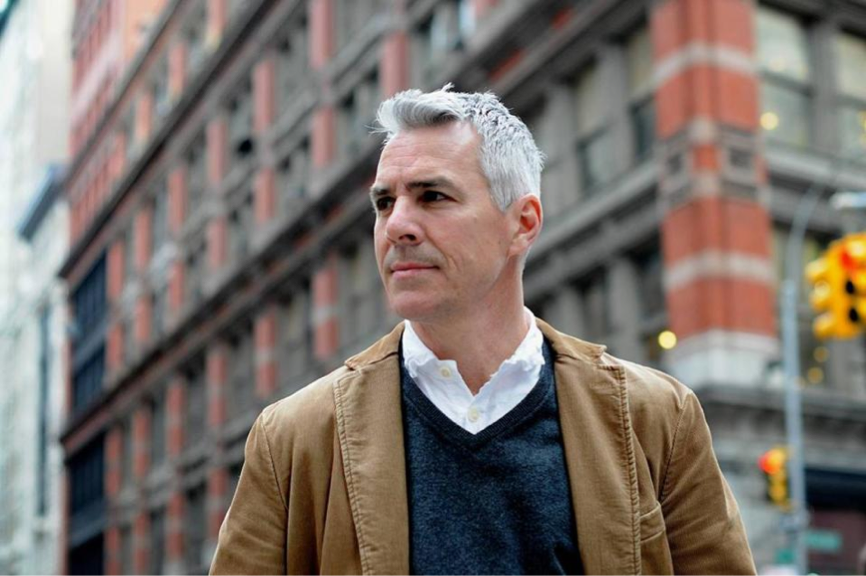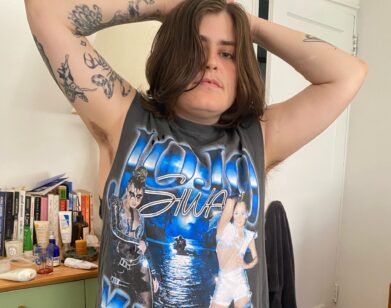Ad Hominem: John Kenney

ABOVE: JOHN KENNEY. IMAGE COURTESY OF RICK KNIEF
John Kenney’s Truth In Advertising (Touchstone) is the rare novel that’s truly cinematic. It is sexy, the plot twists in just the right places; simply put, it’s untamable. You will laugh almost as much as you will relate to the plight of the protagonist, Fin Dolan. Despite being 39 years of age, he’s in developmental arrest, dealing with deep family issues still beyond his maturity. He, like so many of us, is trying to play the karmic cards dealt to him, messing up along the way, vulnerable, bumbling, confused. Truth In Advertising may be a humorous tale about a middle-aged ad guy being forced to hurtle towards adulthood, but this book might just rouse the creative genius in you, too.
We talked to Kenney in New York City about our beautiful life on this planet, from liquid lunches to love to the darkness of loss.
LIANNE STOKES: You’re an advertising creative, and this is a book about an ad man, how much of your book is fiction?
JOHN KENNEY: All of it. I think it has a strong emotional intelligence even through none of those things actually happened to me. For example, my father is a good guy and wasn’t a cop like Fin’s dad. He was a firefighter in Boston, as well as my grandfather and one of my brothers.
STOKES: What made you not want to fight fires?
KENNEY: I think it was the heat, the fire part.
STOKES: [laughs] I really loved a certain romantic scene in the book. From having worked and played in advertising, the romantic interactions between advertising creative people are like a rare psychological experiment.
KENNEY: [laughs] I think part of it is immaturity. Some people in advertising in New York City equate growing up with losing something. I certainly did. We’re grown men and women, yet we instantly revert to being 14-year-olds when it comes to crushes. And for some men there’s no difference between being 26 and 35.
STOKES: How did losing your mom shape your writing?
KENNEY: I think it shaped everything. It’s taken my entire adult life to deal with it. Those kinds of emotions are very difficult to handle, and frankly I don’t think I had courage to for a long time. Part of what happened was meeting my wife, a woman would could help me do that. The family stuff in general is really interesting to me. I know a lot more people who have problems with their families than not. We think we can escape them, whether it’s moving away, or through other people. But we can’t, they’re always with us.
STOKES: How do you think the ad industry has changed since you started?
KENNEY: During the Mad Men era it was mostly men, day-drinking, smoking, and doing a lot of illicit stuff.
STOKES: So much more tame now.
KENNEY: People used to come to advertising from all walks of life: sociology majors, art history majors, and just people who had done things, weird characters with different backgrounds. These people were really passionate about art, photography, and film. They could do that and make a good living through advertising. Today it’s different. A lot of young kids go to ad school. So instead of all these quirky, weird people, you have these assembly line kids who go to school to learn how to write ads.
STOKES: What do you think could change that?
KENNEY: Stop going to ad school. Travel to Bulgaria. Join the Marines. Spend a year working with old people in a hospice.
STOKES: What sucks is that you’re completely right, but these kids, they can’t do that. No recruiter will hire a copywriter or art director because they directed a documentary about building irrigation systems in Africa. They have to have these Rococo paintings posing as ads in their portfolio.
KENNEY: It’s a frustrating thing. Well, tell me more about you, what was your experience?
STOKES: The agency I worked at wasn’t a creative place, but back in the day there was at least a ping-pong table and free beer from the taps in the kitchen. Then new management came in, and the culture devolved. The head of the department was known to patrol the halls early in the morning and at night. I don’t know about the whole office structure. Creative people are like Jack Russell terriers; you can’t keep them cooped up in a cage. They need to be able to think freely.
KENNEY: After being in an office for years, I value being able to freelance. It’s a Wednesday, and I’m going to be able to sit front row at my four-year-old’s ballet recital at 4:30.
STOKES: Sweet. Is it happening at an auditorium?
KENNEY: Nah. It’s just a little room. Some of them get on stage and start crying. I settled down late. I used to look at parents who worked full-time and think, “How do you do that?” I got up at 5 am today, and I’m alive. Writing this book has been an invaluable experience, but the best things I ever created are my children.
TRUTH IN ADVERTISING IS OUT NOW. FOR MORE ON THE AUTHOR, VISIT HIS WEBSITE.






